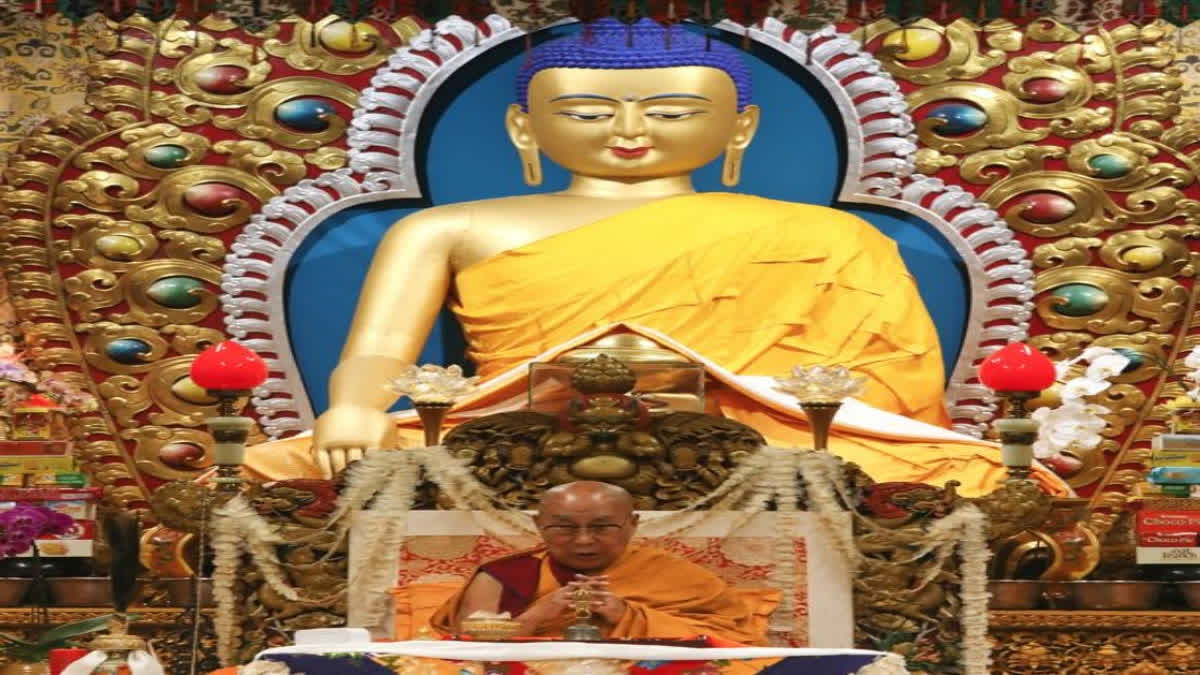Dharamshala: As the Resolve Tibet Bill advances closer to becoming law to enhance American support for Tibet, a high-level US congressional delegation, led by Michael McCaul and comprising former US House Speaker Nancy Pelosi, reached Dalai Lama's Temple at Dharamshala in Himachal Pradesh on Wednesday to meet Tibetan spiritual leader, the Dalai Lama, and interact with representatives of Central Tibetan Administration (CTA), also known as the Tibetan government in exile.
CTA believes the significant meeting highlights bipartisan US support for Tibetan autonomy and promotes dialogue between the Chinese government and the Dalai Lama’s envoys. The Dalai Lama, who fled Tibet in March 1959 after a failed uprising against Chinese rule, believes in a ‘middle-way’ approach, meaning greater autonomy for Tibet rather than outright independence.
On Tuesday, Chinese foreign ministry spokesperson Lin Jian urged US President Biden to not sign the Resolve Tibet Act into law and accused the Dalai Lama of being an 'anti-China separatist' acting under the cloak of religion.
Dalai Lama, the 88-year-old Tibetan monk lives in exile in McLeodganj, a small and quaint hill station in the suburbs of Dharamsala in the northern Indian Himalayas. US lawmakers last week passed a bipartisan bill to enhance support for Tibet and promote dialogue between China and the Dalai Lama towards a peaceful resolution of the long-standing dispute between Tibet and China.
It now goes to President Joe Biden, who is expected to sign it into law. The visiting lawmakers, including Speaker Emerita Nancy Pelosi, will have an audience with His Holiness the Dalai Lama, on Wednesday morning, a CTA spokesperson said.
CTA officials believe the Resolve Tibet Act, once signed, is a powerful reaffirmation of the United States’ steadfast commitment to the people of Tibet. Visiting House Foreign Affairs Committee Chairman McCaul is an original sponsor of the bill. Supporting the bill, McCaul had said, “The United States has never accepted that Tibet was part of China since ancient times as the CCP (Chinese Communist Party) falsely claims. This legislation clarifies US policy and highlights the unique language, religion, and culture of the Tibetan people. It directs US diplomacy to push back against CCP propaganda. In addition, it ensures Tibetans have a say in their own future.”
“This bill stresses the need for dialogue between the CCP and other democratically elected leaders of Tibet. Any resolution must include the wishes and voice of the Tibetan people…Passing this bill demonstrates America’s resolve that the CCP’s status quo in Tibet is not acceptable and I can think of no greater message or gift to the Dalai Lama and the people of Tibet than the swift passage of this bill to get to the President’s desk as soon as possible to help put the people of Tibet in charge of their own future,” he said.
The US delegation visit comes two days ahead of a planned trip by the Dalai Lama to the US to undergo medical treatment for his knees. However, his office said there will be no public engagement, including public audiences, of His Holiness during the visit.
En route to the US, the 14th Dalai Lama will briefly halt in Zurich, Switzerland on June 22. As per the schedule, the visiting delegation will be briefed on the evolution, composition, and functioning of the Tibetan Parliament-in-exile.
The previous crucial meeting of the spiritual leader with the US high-level delegation led by Special Coordinator for Tibetan Issues Under Secretary Uzra Zeya was held here on May 18, 2022. That was the sixth visitation of the successive Special Coordinators to Dharamsala. As per the CTA, in January 2000 Assistant Secretary Julia Taft became the first Special Coordinator to visit Dharamsala. In November 2006, Undersecretary Paula J. Dobriansky visited. In 2009, Undersecretary Maria Otero (then designated to serve as Special Coordinator), accompanied Valerie Jarrett, Senior Advisor to President Barack Obama, on a trip to Dharamsala. Undersecretary Sarah Sewall visited Dharamsala in 2014 and 2016.
China vs US debate on Tibet
Amid the stand-off, the White House has said US President Joe Biden is going to take a decision that he thinks is in the best interest of the United States.
The US Congress, which passed this month the legislation, also calls on Beijing to resume dialogue with the Tibetan spiritual leader the Dalai Lama.
"The President is going to do what he thinks is best on behalf of the American people, that's what I can tell you," White House Press Secretary Karine Jean-Pierre told reporters at her daily news conference on Tuesday when asked about China's warning.
The Act enhances US support for Tibet empowering State Department officials to actively and directly counter disinformation about Tibet from the Chinese government, reject false claims that Tibet has been part of China since "ancient times", push for negotiations without preconditions between the Chinese government and the Dalai Lama or his representatives or the democratically elected leaders of the Tibetan community, and affirm the State Department's responsibility to coordinate with other governments in multilateral efforts toward the goal of a negotiated agreement on Tibet.
China officially refers to Tibet as Xizang. China in April this year said it would talk only with the representatives of the Dalai Lama and not the officials of the Tibetan government in exile based in India.
At the same time, China ruled out dialogue on the Dalai Lama's long-pending demand for autonomy for his remote Himalayan homeland. In its talks with China between 2002 and 2010, the Tibetan side pitched genuine autonomy for the Tibetan people in line with the middle-way policy as proposed by the Dalai Lama.
The Tibetan spiritual leader has said he does not seek political independence for Tibet but seeks autonomy for all Tibetan areas which include Gansu, Qinghai, Sichuan and Yunnan provinces besides the current official Tibet Autonomous Region, a truncated version of Tibet before it was annexed by China. After a failed anti-Chinese uprising in 1959, the 14th Dalai Lama fled Tibet and came to India where he set up the government-in-exile.



